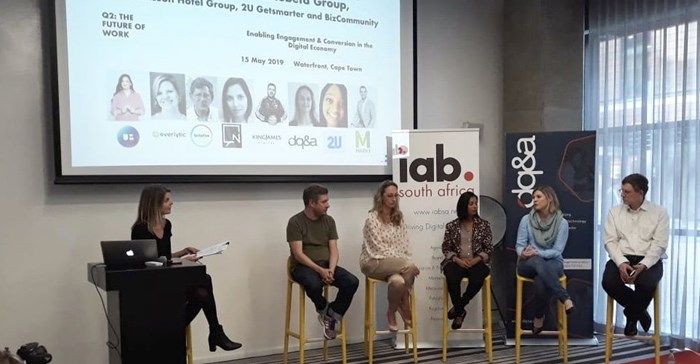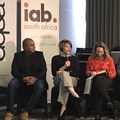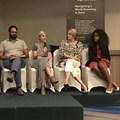IAB Insight Series: How relevant content can deliver results across digital channels

The panel included Ansa Leighton, lead platform and media consultant at DQ&A; Razia van der Schuur, managing director at Change News Digital (ex. IOL); Karyn Strybos, head of marketing for Everlytic; Dan Pinch: executive creative director and co-founder of King James; and Godfrey Parkin, CEO of Britefire. The panel was moderated by IAB SA CEO, Paula Hulley.
The value brands add
Leighton said that in the past, communication to customers was one-sided. It was all about what the brand offered and she reiterated that those days are long gone. Today, it’s all about personalised messages and brands need to add value to that information. She said that nowadays, consumers want to understand the value that brands add to their daily lives.
The reality is, to do this you need information to understand the customer and to speak to them in a pertinent way. Leighton explained that her company consolidates all the data it receives about its consumers, from which they help create a more relevant message that goes out to a brand’s audience.
Ideas that are repeatable and evolvable
Pinch added that nowadays, brands need to come up with an idea that is repeatable but evolvable. He said that his agency tends to use the language of TV, to run a pilot and then continue to pull data from that pilot. Next, they analyse the data and, according to the results, make changes - that’s how the idea evolves.
Pinch said people tend to be terrified of data because they are used to making subjective decisions. They also worry that someone will come along and say, “but the data said you’re wrong.” But he notes that if you embrace it and use it as a tool, data can be used to alter your decisions and you can use it to back up your ideas.
Behaviour change towards technology
Parkin spoke about an e-learning project he is working on for India, and has noticed that historically, there was an attitude towards education using technology. As of late, teachers have become less defensive about technology, embracing it as an aid to help them do their job.
Previously, his company targeted parents to download the app for their kids but now they are seeing teachers telling parents to download the app for their kids. That’s the behaviour change that’s come from their exposure to the world of visual.
As Parkin's earlier keynote presentation was all about how disruptive voice has become, Hulley asked him how voice data can be captured, stored and implemented, particularly whether it can be stored as text.
Parkin answered that voice is being stored as voice, and being searched and analysed as voice. He said it’s a totally different animal from what we used to think of as spreadsheets.
When Hulley asked about the rumours that we are being listened to on our phones and how that information is being used to advertise to us, Parkin responded that the scariest thing about your voice being recorded (which he says definitely is happening), is hackers. Because he argued that if hackers can access recordings of your voice, they might be able to resynthesise it and start making calls to your bank. This starts creating more security issues when it comes to voice recognition, because a lot of banks are using voice recognition as a security feature.
Personalisation
Strybos directed the conversation back to personalisation and held up Old Mutual as an example of a brand that is doing personalisation right. With the help of an agency, they have created a Plan Your Dreams app, where you fill out a questionnaire and then receive an automated email based on what you answered.
"Everlytic created a dynamic email template which pulls in personalised content aimed at my answer, without the need of creating an email for every dream. So when you finish the questionnaire, you’ll receive an email automatically, while it is still fresh in your mind. As a result, they are sitting with open rates of 51% and clickthrough rates of 3%, which are both above the industry average."
People constantly receive content that's not relevant to them but Strybos said they’ve done really well to put that on its head.
Start thinking like an entertainer
Leighton added that a campaign she worked on in collaboration with Sanlam won an award for last year’s Conversations with Yourself, based on life stage dreams, to sign up the client for a particular product. Here, they tried to understand their customers at different stages of their lives. They were really good at adding that value by giving advice to their clients and remarketing a different message every time.
Pinch, whose agency worked on the campaign, said they were trying to get that entertainment value. He explained that in the ad an actor and a younger version of himself have a conversation in a room about the different things they’ve done in their lives. The ad then touches on financial services and the different products they needed at different stages, throughout their life.
Pitch gave the following advice: “Stop thinking like an advertiser, start thinking like an entertainer. An entertainer puts the consumer first and asks, 'What would people find interesting to watch?'" He said that we have been getting it wrong, by putting the brand first and the consumer second.
Remember consistency
Strybos added that you must remember consistency. “I have found with brands, especially in the email space, for example, that they run yearly events, but only start talking to their audience three months before the event, when they try to sell tickets. The value is really about how you give those messages of value throughout the year, so it keeps being top of mind." She said that you can't not communicate with people for six months and then expect them to engage with you.
Van der Schuur told a story from when she worked at Tiso Blackstar. She said that a huge agency presented a campaign for their culture - it was a beautiful campaign but their internal staff members decided against it, because they said the campaign lacked authenticity.
She added said that campaigns should either be authentic or not be done at all. Her advice: "While working on a campaign, make sure you're not breaking the brand you are speaking about. It's about the brand's reputation at the end of the day, and how that brand's reputation is converting its customers into revenue."
The IAB’s next Insight event will be taking place on Thursday, 27 June 2019 and will focus on 'The Role of Technology: Enabling business performance in the Digital Economy'. If you’re interested in attending, contact Kantha at ten.asbai@ahtnaK to register. Free for IAB SA members, standard tickets cost R500.










































